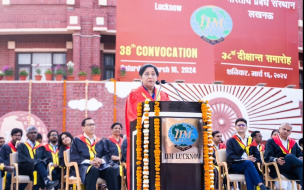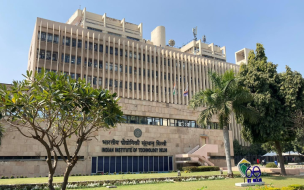Mumbai, Delhi, Bangalore, and many other cities in India are part of a booming tech industry. They are home to many leading companies, as well as top research and business institutes.
Enrolling at business school in India means you’ll have the chance to learn about India’s ecosystem and connect with some of the country’s best tech firms. You could even develop your own digital startup.
Whether you’re just starting out or have a few years of industry experience, with comparatively affordable tuition fees and relaxed work experience requirements, India could be the right choice to study at business school.
Why study an MBA in India?
Studying an MBA in India means gaining a broad academic business acumen. You’ll learn the fundamentals of business topics such as finance, operations management, data science and marketing.
Indian business schools typically combine a strong focus on theoretical knowledge with a practical, hands-on approach to learning. This ensures students graduate fully prepared to enter the workforce.
Preeti Chandak recently graduated from the highly-ranked MBA program at the Indian School of Business (ISB).
“Through my program, I hoped to build on my business fundamentals in a 360 way across marketing, finance, and strategy so that I could benefit from it wherever I go,” she explains.
India also offers high quality education at a reasonable price. Compared to MBA programs in the US, for example, which can cost over $100,000, Indian MBA programs can cost as little as half that price.
Unlike international business schools who typically expect applicants to have worked for a number of years in industry, b-schools in India often take on students who have little to no experience.
This means that even without extensive years under your belt, you can grow your career and access India’s thriving business market.
Studying in India also puts you in close proximity to key sectors within the country’s rapidly expanding economy. Most MBA courses, like ISB for example, incorporate career weeks into the academic calendar so that students can network with Indian industry leaders and build connections for placements and internships.
READ: Top 10 MBA Colleges In India | Fees, Placements, Salaries & Program Details
©IIM Trichy Facebook
What’s life like at top business schools in India?
Studying at a business school in India ensures you can enjoy a range of benefits both inside and outside of the classroom.
You’ll find various opportunities to get involved with your school through committees, associations, or other extracurricular activities.
At KJ Somaiya, a top management college in India, students are encouraged to take part in international immersion opportunities at partner universities or make use of foreign language classes and sport facilities.
Aabhash Adarsh studies at KJ Somaiya, where he is a member of the school’s public relations and branding committee. Aabhash says students in India are encouraged to use their voice and get involved as much as possible.
“We have a student driven culture” he adds.
Business schools in India also emphasize interaction among your cohort. While studying you will work closely to build connections with your peers who can play an active role in your learning.
“I work with many working professionals and people who do not have professional experience on my course. This mix of cultures creates a unique learning experience,” Aabash says.
Applying for your MBA in India
To gain access to the wide range of benefits you can gain from studying in India, you’ll typically have to sit an entrance exam such as the GMAT or NMAT exams.
This will require substantial preparation. To give yourself the best chance of success, it is important that you shortlist your preferred colleges and their individual exam requirements as they may vary between institutions.
While content varies by exam type, entrance tests typically assess your verbal ability, data interpretation, and quantitative strength. You should plan your strategy by working on each of these three skills in your revision material.
Beyond your entrance exam, you’ll also have to complete several other application steps, including providing references, academic transcripts, and personal essays.
“I took the GMAT and wrote two essays plus a letter of recommendation for my ISB application,” Preeti explains.
It is important to consistently take mock exams and get as much feedback as possible on your personal essays to make sure that your application is up to standard, she adds.
Once you’ve completed the application stage, the interview process is the final determiner of your b-school status.
Take time to prepare answers for basic interview style questions and update yourself with any recent developments in the news or business world.
Practicing your interviews with friends or family is also a great way to develop your communication and interview skills. It's worth remembering that a lot of your interview preparation will relate to the information you have already submitted in your application.
“Decent academic scores, certificates, internships, cultural activities, and a healthy balance between academic and non-academic inclusions on your application are extremely beneficial,” says Simrita.
A successful application will land you a place at business school and the opportunity to access the many benefits of studying at business school in India. It could provide you with a launchpad for a high-flying business career.
Next Read:
What's The Cost Of An MBA In India In 2023?








